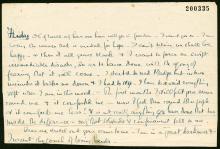BRACERS Record Detail for 19346
To access the original letter, email the Ready Division.
"Friday Oh if I could only have one hour with you in freedom—"
There are two transcriptions of this letter: document .052433, record 99897; document .201133, record 116369.
In each, the first paragraph of the transcription matches the original letter. The second and third paragraphs contain text from a letter which appears not to be extant. Also, the last line of the second paragraph is the last line of the original letter. The original letter was cut and a backing strip of paper pasted on the bottom, on which was posted what is assumed to be a later sentence in the original letter.
Letter 72
BR TO CONSTANCE MALLESON, [16 AUG. 1918]
BRACERS 19346, 116369. AL/TL(TC). McMaster
Previous Brixton letter, BRACERS 19345; next letter, BRACERS 79640
Edited by K. Blackwell, A. Bone, N. Griffin and S. Turcon
<Brixton Prison>1
Friday2
Oh if I could only have one hour with you in freedom. I want you so. I am losing the courage that is needed for hope. I can’t believe we shall be happy — and then it all grows black and I want to force on swift irremediable disaster, so as to have done with the agony of fearing that it will come. I started to read “Madge”3 , a but in two minutes it broke me down and I had to stop. I have to avoid everything soft when I am in this mood. — The first months I still felt your arms round me and it comforted me — now I feel them round other people and it comforts me less! It is not really anything you have done that has made the difference — only that solitude and confinement tell on one.
You ask if your sympathy for people is genuine — nine tenths of it isn’t, the other tenth is genuine, and with luck will develope. You have never yet known unhappiness (though you may think you have), so you haven’t yet as much heart as you will have when you know better what people are enduring. But you have a certain amount of heart, whereas most people have none at all.
Dear one, stretch out your arms to me — I am in a great darkness and I want the touch of loving hands.b
You will find enclosed a discussion of “The International Situation”4 — partly in answer to your remarks.5 When you have read it, please give it to Miss Rinder. I want copies to Garsington,6 and to Massingham (not for publication). It may be shown to any one sympathetic. Could be published as Edward Grubb’s!7 But not as mine.
- 1
[document] The letter was edited from two documents, one manuscript and one typed, in the Malleson papers in the Russell Archives. The unsigned manuscript in BR’s handwriting (BRACERS 19346) has two parts. The first part concludes with the end of the first paragraph. The second is a single sentence beginning “Dear one” and ending with “hands”. This sentence has been cut from somewhere (presumably the foot of the letter containing this text) and stuck to it with tape. The second part of this letter, BRACERS 116369, is typed. The typed transcription was made by Colette at a later date. It begins with paragraph two “You ask if …” and ends with the end of the letter. The sentence that the two documents share is the one beginning “Dear one”. The placement of this sentence is in accordance with its placement in document 201133. Document 201133 retains BR’s spelling “develope”.
- 2
[date] “Friday” is written over “Thursday”. There is a typed and handwritten note, “This may be Friday 16th August 1918”, inserted by Colette or her editor.
- 3
to read “Madge” Colette had sent BR the “script of ‘Madge’” (which was by Miles Malleson). The part of Madge was one of three she had to prepare for the Experimental Theatre (BRACERS 113156 and 113155).
- 4
“The International Situation” The title of the manuscript was “The International Outlook” (RA Rec. Acq. 500). A penetrating analysis of current affairs, it did not appear in The Tribunal under Grubb’s name or anyone else’s, and indeed remained unpublished until it was included as Paper 100 in Papers 14.
- 5
partly in answer to your remarks Her remarks on international affairs cannot be found. She may have made them to BR during a recent visit to Brixton, in a lost letter, or one from which the remarks were removed in her editing of it.
- 6
Garsington By extension, the intellectuals and politicians who frequented it. Ottoline responded herself to “The International Outlook”: “We read your Précis of Foreign Affairs that you sent to Miss Rinder. It is extraordinly <sic> good. Terribly so. It seems such a pity it can’t be published” (25 Aug. 1918, BRACERS 114756).
- 7
Edward Grubb Grubb (1854–1939) was a Quaker, greatly admired by BR and others in the No-Conscription Fellowship for his goodness and common sense. He owned and edited the British Friend, 1901–13, was a highly effective fundraiser as honorary treasurer of the NCF, 1915–19, and active in the Fellowship of Reconciliation (a religious pacifist organization founded in December 1914). BR wrote of him: “He was, when I first knew him, a man of seventy, very quiet, very adverse from publicity, and very immovable.… He acted on behalf of the young men in prison with a complete absence of even the faintest trace of self-seeking” (Auto. 2: 39–40).

